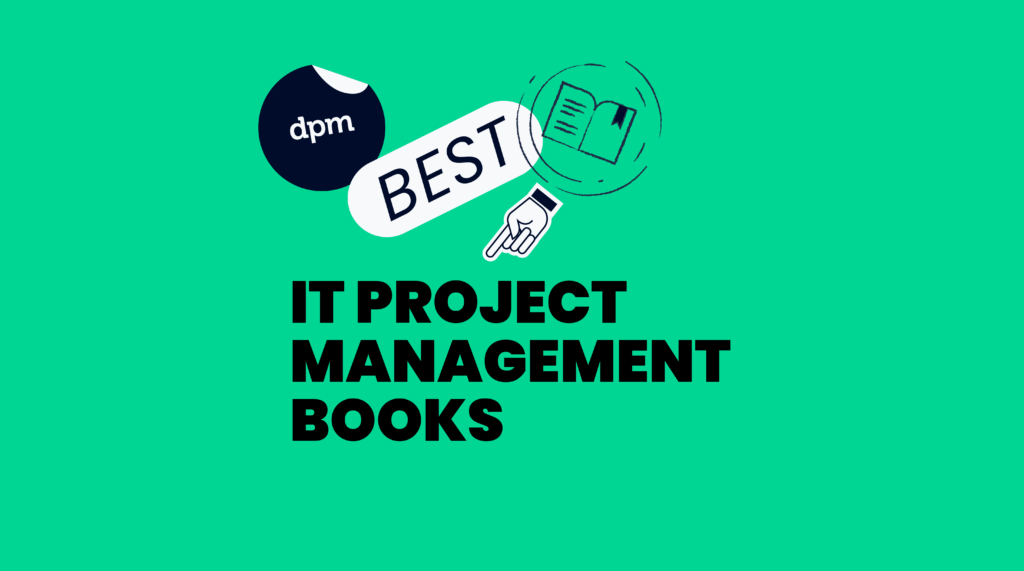Navigating the complexities of IT project management is essential—and you've landed in the right place. In this cultivated selection of the best IT project management books, you'll find a reservoir of practical advice and tools.
These books serve as crucial guides, offering profound insights for newbies, program managers, project teams, and experienced project managers.
You'll learn about:
- Crafting a resilient project plan
- Improving your project management skills
- Facilitating effective collaboration
17 Best IT Project Management Books
I present the following books, which are precisely tailored to address your IT project management challenges:
- Scrum: The Art of Doing Twice the Work in Half the Time by Jeff Sutherland and J.J. Sutherland
- Project Management: A Systems Approach to Planning, Scheduling, and Controlling by Harold Kerzner
- A Guide to the Project Management Body of Knowledge (PMBOK Guide) by Project Management Institute
- Lean Project Management: Eight Principles For Success by Lawrence P. Leach
- The Phoenix Project: A Novel About IT, DevOps, and Helping Your Business Win by Gene Kim, Kevin Behr, and George Spafford
- Agile Project Management with Kanban by Eric Brechner
- Making Things Happen: Mastering Project Management by Scott Berkun
- The Lean Startup by Eric Ries
- Essential Scrum: A Practical Guide to the Most Popular Agile Process by Kenneth S. Rubin
- Project Management for the Unofficial Project Manager by Kory Kogon, Suzette Blakemore, and James Wood
- The Agile Samurai: How Agile Masters Deliver Great Software by Jonathan Rasmusson
- Large-Scale Scrum: More with LeSS by Craig Larman and Bas Vodde
- Continuous Delivery: Reliable Software Releases through Build, Test, and Deployment Automation by Jez Humble and David Farley
- Drive: The Surprising Truth About What Motivates Us by Daniel H. Pink
- The Principles of Product Development Flow: Second Generation Lean Product Development by Donald G Reinertsen
- Information Technology Project Management by Kathy Schwalbe
- There's No Such Thing as an IT Project: A Handbook for Intentional Business Change by Bob Lewis and Dave Kaiser
Overviews Of The 17 Best IT Project Management Books
Here are my overviews of the best IT project management books.
1. Scrum: The Art of Doing Twice the Work in Half the Time by Jeff Sutherland and J.J. Sutherland
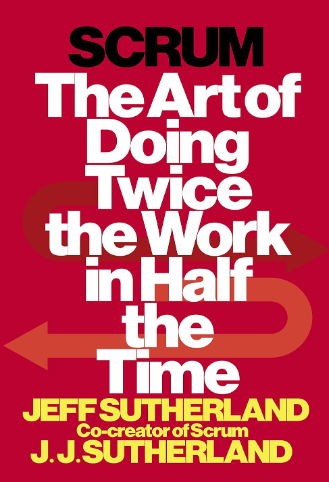
Summary:
This transformative book delves deep into the Scrum methodology, showcasing its revolutionary approach to productivity and success.
Written by the creators of Scrum, it encapsulates the essence of agile development practices, providing readers with a concrete pathway to improve efficiencies, enhance speed, and streamline project objectives.
What You'll Learn:
In this enlightening read, grasp the core principles of the Scrum methodology and how it’s redefining the productivity landscape. You’ll explore actionable strategies to enhance project adaptability, accelerate delivery timelines, and maximize the value of outputs in any domain of project management.
Why You Should Read It:
This book doesn’t just impart theoretical knowledge; it embarks on a transformative journey to unleash the full potential of projects and teams. With practical insights and compelling examples, it is an essential guide for mastering the revolutionary Scrum methodology to redefine success paradigms.
Quote From The Book:
"The central tenet of Scrum is the acknowledgment that customers will change their minds about what they want or need."
About The Author:
Jeff Sutherland is an influential figure in the realm of project management, credited with co-creating the Scrum methodology. J.J. Sutherland, also a key contributor to this remarkable book, carries forward the Scrum legacy.
2. Project Management: A Systems Approach to Planning, Scheduling, and Controlling by Harold Kerzner
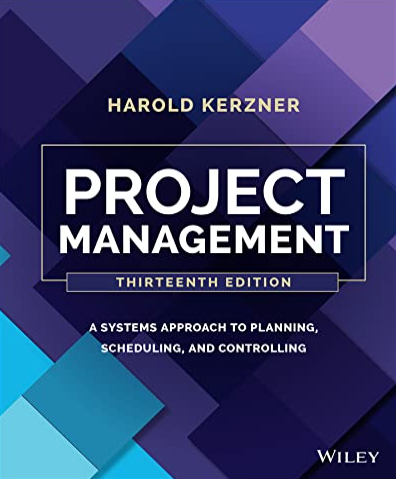
Summary:
This meticulous work by Harold Kerzner is a comprehensive exploration of the multifaceted world of project management. Serving as an authoritative guide, the book delves into planning, scheduling, and controlling projects from various industries, providing a wealth of knowledge enriched with case studies and focused methodologies.
What You'll Learn:
Readers will acquire a profound understanding of project management's systems approach, enriched with practical insights, effective tools, and versatile techniques that are applicable across a myriad of project types and industries.
Why You Should Read It:
The book stands as a pillar in the literature of project management, offering a blend of foundational knowledge and advanced strategies. Its content is instrumental for those seeking to navigate the complexities of managing various projects with a systematic and well-structured approach.
Quote From The Book:
"Project management is the planning, organizing, directing, and controlling of company resources for a relatively short-term objective that has been established to complete specific goals and objectives."
About The Author:
Harold Kerzner is a renowned figure in the project management arena, with a wealth of experience and knowledge. Connect and engage with Harold Kerzner on LinkedIn.
3. A Guide to the Project Management Body of Knowledge (PMBOK Guide)by Project Management Institute
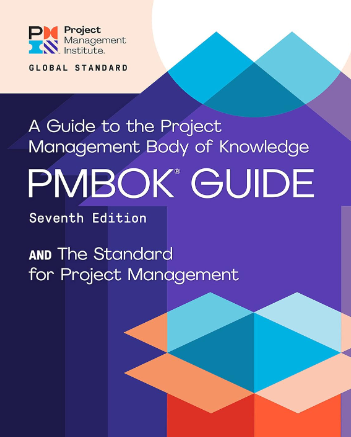
Summary:
This monumental guide by PMI is an essential repository of best practices and guidelines in project management. The seventh edition encapsulates a wealth of updated knowledge, streamlined processes, and a reinforced framework to navigate the ever-evolving project management landscape successfully.
What You'll Learn:
This guide equips readers with robust methodologies and best practices that encapsulate the breadth and depth of project management. Immerse yourself in a comprehensive exploration of updated guidelines, processes, tools, and terminologies to enhance project management competencies.
Why You Should Read It:
A cornerstone in project management literature, this guide is instrumental for both novices and seasoned professionals. It offers a meticulously curated amalgamation of knowledge and practices that stand pivotal in mastering the art of project management.
Quote From The Book:
“Projects are used to bring about change, and project management is the application of knowledge, skills, tools, and techniques to project activities to meet the project objectives.”
About The Author:
The Project Management Institute (PMI) is a global leader in project management, offering extensive resources, certifications, and research in the field.
4. Lean Project Management: Eight Principles For Success by Lawrence P. Leach
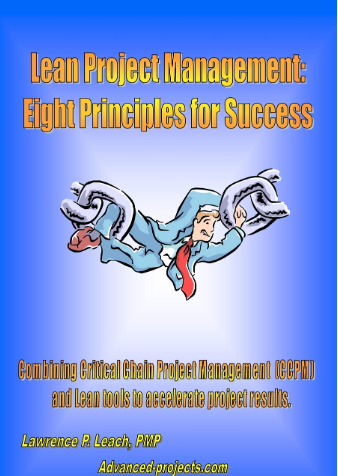
Summary:
Lawrence P. Leach's insightful book is a deep dive into the principles of lean project management. The book systematically unfolds eight core principles that stand instrumental in enhancing project outcomes, streamlining processes, and driving success in project management endeavors.
What You'll Learn:
Through the lens of Leach’s vast experience, the book unravels strategies and practices that underscore the philosophy of lean project management. It equips readers with actionable insights to optimize processes, reduce waste, and enhance value in project deliverables.
Why You Should Read It:
The book provides a profound understanding of lean principles tailored to meet contemporary project management challenges. Leach’s practical approaches guide professionals in cultivating a mindset and applying tactics that resonate with efficiency and continuous improvement.
Quote From The Book:
"Lean thinking changes the focus of management from optimizing separate technologies, assets, and vertical departments to optimizing the flow of products and services through entire value streams..."
About The Author:
Lawrence P. Leach is a seasoned professional in lean project management with a rich reservoir of expertise and insights.
5. The Phoenix Project: A Novel About IT, DevOps, and Helping Your Business Win by Gene Kim, Kevin Behr, and George Spafford
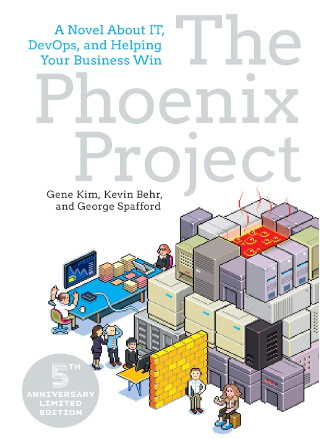
Summary:
Intertwining the realms of IT and business transformation, this book takes readers on a transformative journey through the world of IT operations. With a compelling narrative style, it unravels the intricacies of DevOps, portraying its significance in propelling business triumphs.
What You'll Learn:
Discover the trials, tribulations, and triumphs in IT projects, and unearth invaluable insights into the transformative power of DevOps. This novel will cultivate a comprehensive understanding of how DevOps practices can be leveraged to overturn IT adversities and promote business success.
Why You Should Read It:
Dive into a captivating storyline that does more than just tell a tale—it imparts crucial lessons, strategies, and the transformative potential of DevOps in steering IT projects toward success and business innovation.
Quote From The Book:
"Improving daily work is even more important than doing daily work."
About The Author:
Gene Kim, Kevin Behr, and George Spafford are a trio of authors with an extensive repertoire of IT knowledge and innovative thinking.
6. Agile Project Management with Kanban by Eric Brechner
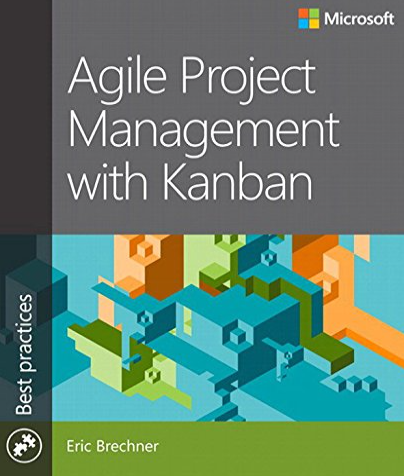
Summary:
It is a masterpiece that unveils the strategic prowess of Kanban in enhancing agile project management practices. Brechner meticulously deciphers the essentials of Kanban, guiding readers through its pragmatic adoption to invigorate project outcomes.
What You'll Learn:
Brechner’s penmanship illuminates the pathway to mastering Kanban in an agile environment. He divulges practical knowledge, tactics, and transformative strategies to empower professionals in optimizing workflow, improving project predictability, and accelerating delivery timelines.
Why You Should Read It:
Embarking on the journey through this book’s pages reveals a reservoir of knowledge that holds the power to revolutionize agile project management practices. It serves as a beacon for those seeking to harness the synergistic potentials of agile and Kanban for project triumphs.
Quote From The Book:
"Kanban isn’t just for improvement. It’s for learning and continuous improvement. It’s for success."
About The Author:
Eric Brechner, a luminary in agile and Kanban methodologies, brings a wealth of knowledge and innovative strategies to the realm of project management.
Find more agile project management books here.
7. Making Things Happen: Mastering Project Management by Scott Berkun
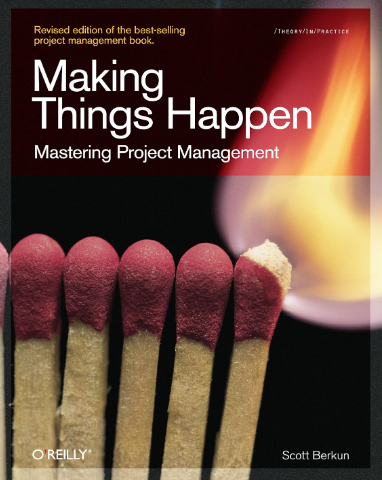
Summary:
Scott Berkun takes a deep dive into the practicalities and psychologies of project management in Making Things Happen. The book shines a spotlight on the real-world dynamics of planning, executing, and steering projects to success, beyond conventional methodologies.
What You'll Learn:
Explore the essence of project management through lenses uncolored by jargon and rigidity. Berkun presents a candid narrative, unfolding softer skills like leadership, creativity, and communication, which are central to managing and driving projects effectively.
Why You Should Read It:
Making Things Happen emerges as a confluence of wisdom and actionable insights, providing a fresh perspective on mastering the art of project management. Berkun’s narrative stands as an invaluable companion for aspiring leaders in navigating the multifaceted terrains of project realization.
Quote From The Book:
"Good project managers admit ignorance because it’s an opportunity to learn from others."
About The Author:
Scott Berkun, an author, and speaker is a fountain of knowledge with extensive experience in tech and project management. Engage further with his insights through his website.
8. The Lean Startup by Eric Ries
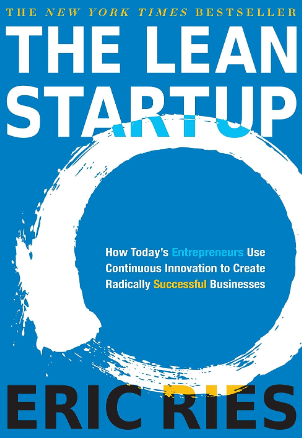
Summary:
Eric Ries revolutionizes entrepreneurial and business landscapes with The Lean Startup. The book is a methodical guide that unveils a new approach towards business development and product innovation, all through a lean, efficient pathway.
What You'll Learn:
Eric Ries offers insights into a new philosophy of entrepreneurship. You’ll discover strategies focused on efficiently building a startup by building a minimum viable product, measuring its success in the market, and learning from the results.
Why You Should Read It:
The Lean Startup isn’t just a book, it's a movement. Reading it provides essential knowledge that will enable a mindset shift towards more agile, customer-focused, and iterative approaches to business development and product innovation.
Quote From The Book:
"Success is not delivering a feature; success is learning how to solve the customer’s problem."
About The Author:
Eric Ries is a pioneer in the world of running startups successfully.
9. Essential Scrum: A Practical Guide to the Most Popular Agile Process by Kenneth S. Rubin
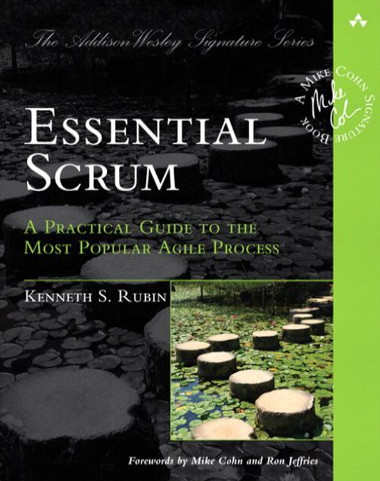
Summary:
Kenneth S. Rubin distills the essence of Scrum, elucidating the principles, roles, and processes of this agile methodology. The book is a conduit to Rubin’s expert insights, illuminating Scrum practices with pragmatic advice and engaging visuals.
What You'll Learn:
Rubin encapsulates rich, real-world knowledge of Scrum, guiding readers through its fundamentals and intricacies. His guidance sheds light on how to leverage Scrum's iterative power for any project’s triumph.
Why You Should Read It:
Essential for those desiring a profound understanding of Scrum, this book is a vault of Rubin's practical wisdom. It stands as a pillar to elevate your Scrum mastery, ensuring you wield its methodologies with finesse.
Quote From The Book:
"Scrum is a simple framework for effective team collaboration on complex projects."
About The Author:
Kenneth S. Rubin, with a wealth of experience, is a beacon in the realms of agile and Scrum.
10. Project Management for the Unofficial Project Manager by Kory Kogon, Suzette Blakemore, and James Wood
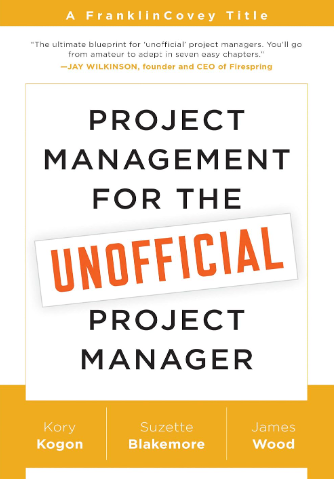
Summary:
This book delivers the essentials of project management in a captivating manner. Kogon, Blakemore, and Wood have crafted a guide that eases the reader into the world of project management, making the intimidating concepts approachable and engaging.
What You'll Learn:
This book unveils effective project management principles and tools, focusing on people, and ensuring success without formal authority. The authors share invaluable strategies to enhance collaboration and steer projects to success easily.
Why You Should Read It:
It is curated especially for those who find themselves managing projects without official training. Its approach prioritizes people, making the process of managing projects more organic and achievable.
Quote From The Book:
"People are more likely to be persuaded by their own reasons than by yours."
About The Author:
Kory Kogon, Suzette Blakemore, and James Wood bring their wealth of experience into this insightful book.
11. The Agile Samurai: How Agile Masters Deliver Great Software by Jonathan Rasmusson
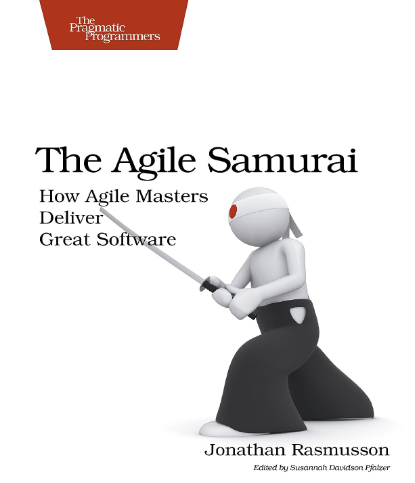
Summary:
Dive into the world of agile project management with Jonathan Rasmusson. Rasmusson unveils the principles, tools, and practices that allow you to deliver great software consistently.
What You'll Learn:
Acquire the skills and insights required to kick-start a project, manage stakeholders, and deliver value. The book offers knowledge on creating a fitting agile environment, promoting improvement, and facilitating effective communication in teams.
Why You Should Read It:
This book is instrumental for absorbing the essence of agility, illuminating the path to mastering software deliveries, and offering a hands-on approach, fortified with real-world examples and intuitive explanations.
Quote From The Book:
"Agility is about flexibility and the willingness of a team to adapt to emerging business requirements."
About The Author:
Jonathan Rasmusson brings years of invaluable experience in agile methodologies to the table. You can find more about his professional journey and insights on LinkedIn.
12. Large-Scale Scrum: More with LeSS by Craig Larman and Bas Vodde
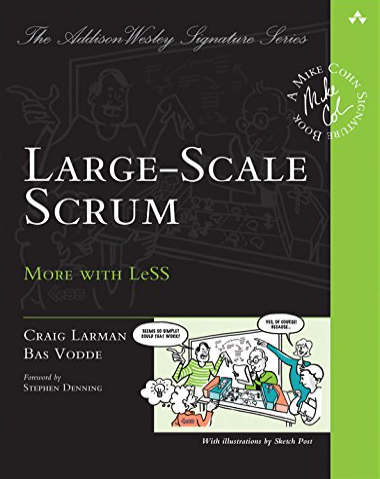
Summary:
In Large-Scale Scrum: More with LeSS, Larman and Vodde offer an expansive guide to scaling Scrum practices beyond the confines of a singular team. They unfold methodologies that can handle large, multi-team Scrum projects and programs with finesse and agility.
What You'll Learn:
This book explores scaling frameworks that encourage the organic growth of Scrum across organizations. Detailed case studies educate readers on the deployment of LeSS and its variances in various organizational settings.
Why You Should Read It:
Large-Scale Scrum: More with LeSS is a vital tool for individuals looking to bridge the gap between standard Scrum practices and the necessary frameworks required for larger Scrum undertakings.
Quote From The Book:
"LeSS is Scrum applied to many teams working together on one product."
About The Author:
Craig Larman and Bas Vodde, with their profound experiences, contribute substantially to the realms of large-scale Scrum.
13. Continuous Delivery: Reliable Software Releases through Build, Test, and Deployment Automation by Jez Humble and David Farley
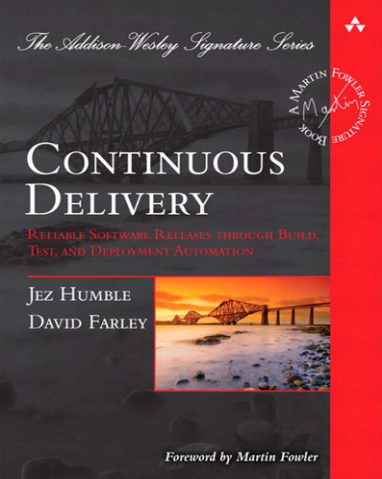
Summary:
Continuous Delivery is a pivotal book by Jez Humble and David Farley that presents a comprehensive view of the principles and technical practices that enable reliable and sustainable software delivery practices.
The authors elucidate the dynamics of continuous delivery and its capacity to improve the software development process across various stages.
What You'll Learn:
Readers will learn the core principles of continuous delivery, including automation, deployment pipelines, and effective collaboration among teams. They will gain insights into evolving effective practices to consistently deliver reliable software without causing disruptions.
Why You Should Read It:
The book provides a roadmap to fundamentally transform the software development and delivery process. It’s a valuable asset to professionals who aim to make software delivery more collaborative, productive, and reliable through continuous delivery practices.
Quote From The Book:
"Continuous delivery is a software development discipline where you build software in such a way that the software can be released to production at any time."
About The Author:
Jez Humble and David Farley are distinguished figures in the software development industry.
Find more software project management books here.
14. Drive: The Surprising Truth About What Motivates Us by Daniel H. Pink
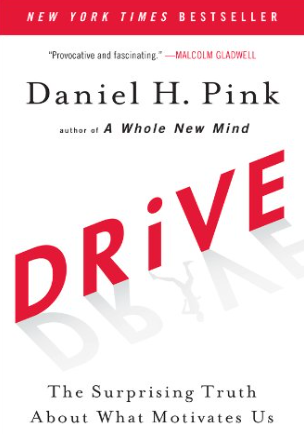
Summary:
Drive by Daniel H. Pink is an exploration of human motivation in the modern age. Pink dissects the traditional carrot-and-stick model of motivation, revealing its inadequacies and inconsistencies.
He introduces the concept of Motivation 3.0, a framework revolving around autonomy, mastery, and purpose, arguing that these are the key elements that truly drive and inspire individuals.
What You'll Learn:
The book enlightens readers on the new framework of motivation—autonomy, mastery, and purpose. Pink explains why the traditional methods of motivation might not be effective anymore and how embracing the new paradigm can lead to a more fulfilling personal and professional life.
Why You Should Read It:
Drive will provide you with a new perspective on motivation that goes beyond traditional rewards and punishments. It is a must-read for those looking to ignite passion and creativity in their careers and other areas of life.
Quote From The Book:
"The secret to high performance and satisfaction—at work, at school, and at home—is the deeply human need to direct our own lives, to learn and create new things, and to do better by ourselves and our world."
About The Author:
Daniel H. Pink is a renowned author and speaker on business and human behavior.
15. The Principles of Product Development Flow: Second Generation Lean Product Development by Donald G Reinertsen
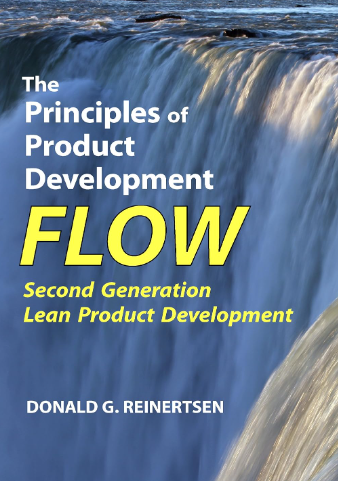
Summary:
This book is a comprehensive guide that dives into the principles of product development flow and its role in lean product development.
Donald G Reinertsen puts forth a meticulously crafted narrative challenging conventional wisdom and old-school methodologies in product management and development.
He presents practical concepts, methods, and illuminating examples to offer a new lens through which to view effective product development strategies and processes.
What You'll Learn:
Readers will gain insights into the new principles of lean product development and the intricacies of product development flow. Reinertsen explores essential concepts like queues, variability, batch size, and more, articulating how these factors interplay in the process of product development.
Why You Should Read It:
This book is a goldmine of knowledge for product developers looking to elevate their processes and strategies. The in-depth exploration of lean principles and their application to product development makes it a must-read for those seeking to optimize their product development flow.
Quote From The Book:
"In product development, our problem is not the absence of good ideas, but the presence of bad ones. The lean principle of amplifying learning emphasizes the importance of quickly identifying and discarding these bad ideas."
About The Author:
Donald G Reinertsen is a prominent figure in the realms of product development and process design. He has contributed immensely through his writings and thought leadership.
16. Information Technology Project Management by Kathy Schwalbe

Summary:
This book by Kathy Schwalbe is an insightful guide into the realm of information technology project management. It covers a wide spectrum of fundamental concepts, practices, and methodologies that are pivotal for managing IT projects successfully.
The author utilizes real-world examples, actual industry case studies, and a plethora of other essential resources to elucidate the nuances of IT project management in a comprehensible manner.
What You'll Learn:
Readers will dive deep into the core concepts and various phases of IT project management. Kathy Schwalbe ensures that readers are equipped with essential knowledge and practical insights, covering areas such as project initiation, planning, executing, monitoring, controlling, and closing IT projects.
Why You Should Read It:
This book is incredibly resourceful for both students and professionals who wish to gain a robust understanding of IT project management. Its practical approach, fortified by real-world examples and case studies, makes it a comprehensive guide that adds significant value to the reader's knowledge base and practical expertise.
Quote From The Book:
"Project managers who understand their organization’s strategy can become effective advocates of projects aligned with the firm’s mission and strategy."
About The Author:
Kathy Schwalbe is a sought-after academician and author specializing in project management, particularly in the IT sector.
17. There's No Such Thing as an IT Project: A Handbook for Intentional Business Change by Bob Lewis and Dave Kaiser
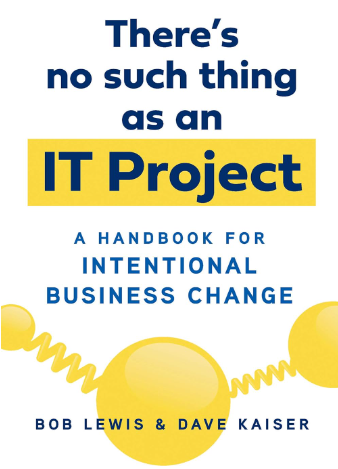
Summary:
This insightful book by Bob Lewis and Dave Kaiser challenges conventional wisdom by asserting that there’s no such thing as an IT project.
Instead, they argue that what are commonly labeled as "IT projects" are, in reality, intentional business change endeavors. They walk readers through various concepts and methods that instigate and manage meaningful organizational transformations, using technology as a tool to drive such changes.
What You'll Learn:
Readers will grasp essential strategies and methods for business change, with technology serving as a catalyst. The authors provide a new perspective on managing and implementing transformational changes in an organization, focusing on business objectives rather than purely technological outcomes.
Why You Should Read It:
This book is pivotal for IT professionals and business leaders who wish to align technology projects closely with organizational goals and business strategies. It offers a refreshing perspective that emphasizes the role of technology in enabling meaningful business transformations.
Quote From The Book:
"Technology isn’t something you do. It’s something you use to achieve intentional business changes."
About The Author:
Bob Lewis and Dave Kaiser are experts with rich experience in IT and organizational transformation. Their insights reflect a deep understanding of how technology intersects with business change.
IT project managers might also find these program management books insightful.
What's Next?
Find more books about project management here, or join our membership community to network with and learn from 100's of other digital project managers.

